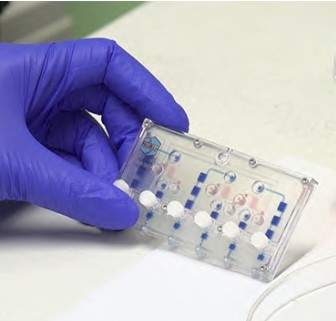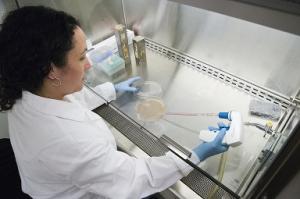Research
From the time of its inception, the UW Division of Nephrology has led the field of kidney research in innovation and discovery.
Work done in the early years by Dr. Belding Scribner made long-term outpatient dialysis for kidney failure a reality. Subsequently, under the leadership of Dr. William Couser, UW became the first academic division to focus on understanding the pathogenesis of kidney diseases, particularly immune-mediated glomerular diseases, instead of renal physiology.
Dr. Stuart Shankland further cemented the research credentials of the division with the establishment of the Kidney Research Institute in 2008 with generous support from the Northwest Kidney Centers under the stewardship of the organization’s CEO, Joyce Jackson.
Today, under the leadership of Division Head Dr. Rajnish Mehrotra and Research Directors Drs. Ian de Boer and Leila Zelnick, our divisional faculty lead a large and diverse research portfolio that advances our understanding of kidney diseases through laboratory research and clinical research, which includes translational studies, qualitative research, cohort studies, and clinical trials.
Leadership

Ian de Boer, MD, MS
Professor
Director of Research, Nephrology
Director, Kidney Research Institute
deboer@uw.edu

Leila Zelnick, PhD
Research Associate Professor
Director of Biostatistics, Kidney Research Institute
lzelnick@uw.edu
Interdisciplinary Research
We collaborate and partner with many complementary fields. They include bioengineering, pharmaceutics, immunology, pathology, public health, epidemiology, biostatistics, health care services, and more. Each serves as a component of the foundation for our comprehensive approach to treating kidney diseases and accompanying complications.
funded research
Nephrology faculty are funded by individual grants as well as major program project grants from the National Institutes of Health (NIH), numerous other government and non-governmental entities, and foundations.
Many of our junior faculty members have career development grants (NIH K-awards), and we have a strong record of transitioning to independent NIH R01 awards.
In recent academic years, the NIH funded 80% of all submitted proposals. We have been proud to have an NIH T-32 training grant in the Division for over 20 years, with a new U2C/TL1 training grant now underway.
NIDDK U2C/TL1 Award
Northwest Comprehensive Research Training in Kidney, Urologic and Hematologic Sciences (NCOR-KUH) Program
Research Advancements
Through research funding and innovation, we have advanced the field of kidney health and transformed lives.

BLOSSOM Study
In the BLOSSOM Study, investigators at the KRI are measuring blood sugars using new technology to look at patterns in blood sugar levels. By understanding how and when low and high blood sugars happen, they hope to help dialysis patients have more controlled blood sugars and feel better and safer.

ASCEND Trial
ASCEND is a trial of sertraline vs. CBT for End-Stage Renal Disease patients with depression. The study looks at ways to help hemodialysis patients who have depression, either through cognitive-behavioral therapy during their dialysis sessions or via drug therapy with sertraline.

KIND-HF Study
The KIND-HF Study compares traditional and novel measures of kidney function and the response to treatment for acute decompensated heart failure while in the hospital and post-discharge.Acute decompensated heart failure is a major cause of hospitalization and poor clinical outcomes in the U.S. population. Kidney function is an important determinant of management and prognosis in patients with acute decompensated heart failure, but current clinical measures of kidney function are inadequate for use in these patients.

Kidney on a Chip
The Kidney Research Institute (KRI) has engineered a kidney tissue chip to predict drug safety. The aim is to design human tissue chips that replicate human organs to test drugs in their early stages to see if they will cause complications to the organs. The Extended Longevity of 3D Tissues and Microphysiological Systems for Modeling of Acute and Chronic Exposures to Stressors Study aims to extend the use of our kidney chip and organoid systems to model extended (6 month) exposures to stressors and subsequent recovery. This will allow a better understanding of chronic kidney disease and the prediction of chronic toxicity and injury to accelerate drug development and guide the development of strategies to prevent or mitigate nephrotoxicity caused by drugs, environmental chemicals, pathogens, and microgravity.

Backpack-Size Artificial Kidney
A prototype Wearable Artificial Kidney (WAK) is a device intended to free patients from thrice-weekly, hours-long visits to dialysis centers. The FDA granted the Artificial Kidney Expedited Access Pathway status after the device performed successfully in its first U.S. clinical trial at the University of Washington Medical Center. This is one of the first innovations in dialysis technology in decades, and it has enormous potential to change patients’ quality of life.
Learn about Innovative Kidney Research Projects
Seattle has been at the heart of kidney innovation since Belding Scribner and his team invented the Scribner shunt and Clyde Shields stepped up to become the first maintenance dialysis patient in 1960. The KRI continues that spirit of innovation with new technologies.
UW Nephrology Women in Research
Watch: Women in Research video
Publications

Published Research
Our faculty consistently publishes new research in nationally recognized journals.
A history of innovation
The first Scribner Shunt was successfully used on a dialysis patient in 1960, paving the way for patient survival rates in kidney disease.
Seattle has long been the place for kidney research. In 1960, Dr. Belding H. Scribner, the first division head of nephrology at the University of Washington, and his colleagues developed a blood access device for hemodialysis called the Scribner Shunt, providing a lifeline for patients with kidney failure.
The shunt allowed patients to receive life-saving dialysis on a long-term basis, changing kidney failure from a death sentence to a treatable condition. Dr. Scribner subsequently founded Northwest Kidney Centers, the first outpatient dialysis program in the world, and made Seattle an international center for advances in kidney disease.
research support
Kidney Research Support Fund
The future of kidney care depends on a robust research program. Invest in the future by providing critical resources for nephrology research.




